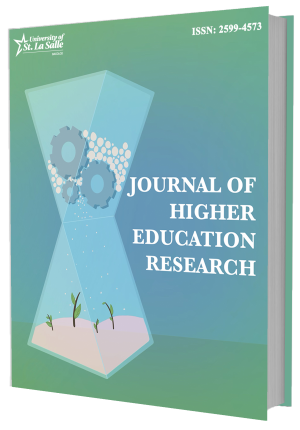Online Student Engagement and Mathematics Performance in the Learning Management System: A Path Analysis
https://doi.org/10.70228/JHER2024020
Cite this article Read this article
ABSTRACT
The study's primary objective was to explore the relationships between students' learning management system analytics, online engagement, and mathematics performance. It utilized a causal quantitative design employing path analysis to determine the indirect and direct effects of students' learning management analytics and the mediating role of online engagement in mathematics performance. Participants involved 835 college freshmen, and their analytics were evaluated in terms of their participation and page views in a specific course in mathematics. Results showed that students across sexes and colleges have a high level of online engagement in terms of cognitive, behavioral, and psychological aspects, while their mathematics performance across sexes and colleges is interpreted as very good. When the mediating role of online engagement between students' analytics and mathematics performance was investigated using path analysis, results revealed that psychological engagement is a mediating factor between the number of participation and math performance. Findings further showed partial mediation since the number of participation and page views also showed significant direct effects on online engagements and mathematics performance. The study concludes that students with higher participation in learning management systems are associated with higher online engagement. A particular suggestion is to integrate methods of intervention into the online instructional design to perpetuate students' positive psychological engagement, such as providing meaningful and inspiring activities accompanied by instructors' THE LEARNING MANAGEMENT SYSTEM AND STUDENT ENGAGEMENT guidance and feedback, as this study found that psychological engagement serves an important mediator function involving learning analytics and achievement in mathematics.
Keywords: Learning Management System, Canvas, student engagement, performance in Mathematics, psychological online engagement

Volume 9, June, 2021 EDITION
Published 2021
Editor's Note
It is with great pride that we present this latest collection of scholarly contributions in Volume 9 of the Journal for Higher Education Research, highlighting the diverse research endeavors undertaken by our esteemed authors. Each study featured in this volume emphasizes the commitment to academic excellence and practical impact, addressing challenges and uncovering insights relevant to a wide range of disciplines in higher education research. Macoy and Quezon delve into real estate buyers' preferences and financing determinants, offering valuable implications for developers and policymakers in Iloilo and Negros Occidental. Peña and Tedoco explore the opportunities and challenges faced by small enterprise bakery operators, providing practical recommendations for sustainability and growth within this vital sector. Dura's linguistic landscape analysis uncovers the cultural and ideological dynamics within a public high school in Bacolod City, emphasizing the importance of multilingualism in educational environments. Similarly, Quezon addresses the crucial topic of anxiety among young adults, shedding light on barriers to help-seeking and the innovative coping strategies developed in the absence of professional intervention. The work of Gabarra and Lastimoza showcases the effectiveness of graphic-[1]based supplementary reading materials in enhancing literature instruction, bridging traditional texts with modern, interactive tools. Pillo and her team present a sustainable ecotourism plan for Bago City and Pulupandan, highlighting the critical interplay between community involvement and ecological stewardship. The study by Tirado and colleagues establishes a strong link between online engagement and academic performance, emphasizing psychological engagement as a key mediator in mathematics education. Ochavo evaluates a school-[1]administered youth facility for children in conflict with the law, offering insights into its transformative impact and areas for improvement. Finally, Capay and her co-authors examine the implementation of the carousel delivery system in modular learning, underscoring its benefits while advocating for enhancements to further improve student experiences. This issue serves as a testament to the boundless dedication and ingenuity of our authors. We would like to thank our editors and reviewers for meticulously working on these significant research works. We hope these studies inspire further academic pursuits and practical applications that benefit our communities. Sincerely, JOVAL N. MARTINEZ Editor-in-Chief


